Beautiful Enterprise SFQ04A Bluetooth Module User Manual update
Beautiful Enterprise Co., Ltd. Bluetooth Module update
Users Manual
BC05 ROM Module Spec.
Shenzhen Synchron Electronics Co., Ltd. 2012.08
1. General Description and Specification
1.1 General Description
This product is a Class 2 SMT Bluetooth Module used CSR BC5-BlueTunes ROM. It
provides data and voice communications. Support data rate up to 3Mbps.
General Features:
■ Class 2 Bluetooth Module
■ Bluetooth Spec. V2.1+EDR Compliant
■ Support Firmware Upgrade
■ High-quality audio 95dB SNR on DAC playback
■ Integrated linear regulator with 1.5V output from 1.8V to 2.7V input
■ Integrated Switched-mode Regulator
■ Integrated 150mA lithium Battery Charger
■ Integrated Microphone bias& LED Driver
■ 64MIPS Kalimba DSP Co-processor
■ cVc support for echo and noise reduction
■ Green (RoHS Compliant)
1.2 Device Details
Radio
Common TX/RX terminal simplifies external matching; eliminates external antenna switch
BIST minimises production test time
Bluetooth v2.1 + EDR specification compliant
Transmitter
4dBm RF transmit power with level control from onchip 6-bit DAC over a dynamic range
>30dB
Class 2 and Class 3 support without the need for an external power amplifier or TX/RX
switch
Receiver
Receiver sensitivity of -70dBm
Integrated channel filters
Digital demodulator for improved sensitivity and cochannel rejection
Real-time digitised RSSI available on HCI interface
Fast AGC for enhanced dynamic range
Baseband and Software
Internal ROM
48KB of internal RAM, allows full-speed data transfer, mixed voice/data and full piconet
support
Logic for FEC, HEC, access code correlation, CRC, demodulation, encryption bit stream
generation, whitening and transmit pulse shaping
Transcoders for A-law, μ-law and linear voice from host and A-law, μ-law and CVSD voice
over air
FastStream, CSR low latency codec significantly, reduces the latency of the audio link,
from source to, sink, avoiding lip-sync issues when simultaneously listening to audio and
watching video images
Bluetooth v2.1 + EDR specification Secure Simple Pairing support
DSP based single-microphone cVc echo and noise reduction is included in the BlueTunes
ROM QFN
A new high-performance dual-microphone noise reduction is available in BlueTunes ROM
QFN as a licensed option for an extra 20dB of noise suppression, order code
BCSWCVCHS2MR3
Physical Interfaces
Synchronous serial interface for system debugging
I
2C compatible interface to external EEPROM containing device configuration data (PS
Keys)
UART interface
Two LED drivers with faders
Kalimba DSP
Very low power Kalimba DSP co-processor, 64MIPS, 24-bit fixed point core
Support for SBC and MP3(1) codec for improved audio quality
Single-cycle MAC; 24 x 24-bit multiply and 56-bit accumulator
32-bit instruction word, dual 24-bit data memory
6K x 32-bit program RAM,8K x 24-bit +8K x 24- bit data RAM
64 x 32-bit program memory cache when executing from ROM
Stereo Audio Codec
16-bit internal codec
DAC for stereo audio
ADC dual channel mono voice band audio
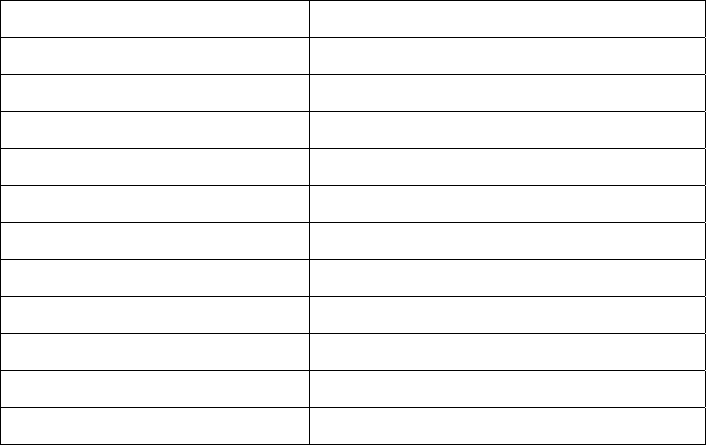
Integrated amplifiers for driving 16Ω speakers; no need for external components
Support for single-ended speaker termination and line output
Integrated low-noise microphone bias
Auxiliary Features
Power management includes digital shutdown and wake-up commands with an integrated
low-power oscillator for ultra-low power Park/Sniff/Hold mode
On-chip regulators: 1.5V output from 1.8V to 2.7V input
On-chip high-efficiency switched-mode regulator; 1.8V output from 2.7V to 4.4V input
Power-on-reset cell detects low supply voltage
10-bit ADC available to applications
On-chip 150mA charger for lithium ion/polymer batteries
1.3 Specification
Chipset CSR BlueTunes ROM QFN
Specification Version Bluetooth V2.1+EDR
Power Class Class 2
Frequency Band 2400~2483.5MHz
Max. Tx Power -6~+4dBm
RX Sensitivity <-70dBm
Distance >10m(No obstacle)
ROM Size 64K
Power Voltage 3.3V
Supply Current <40mA
Operation Temperature -10 ~ +45 ℃
Dimension 32mm(L)x 13.5 mm(W) x 1.2mm(H)
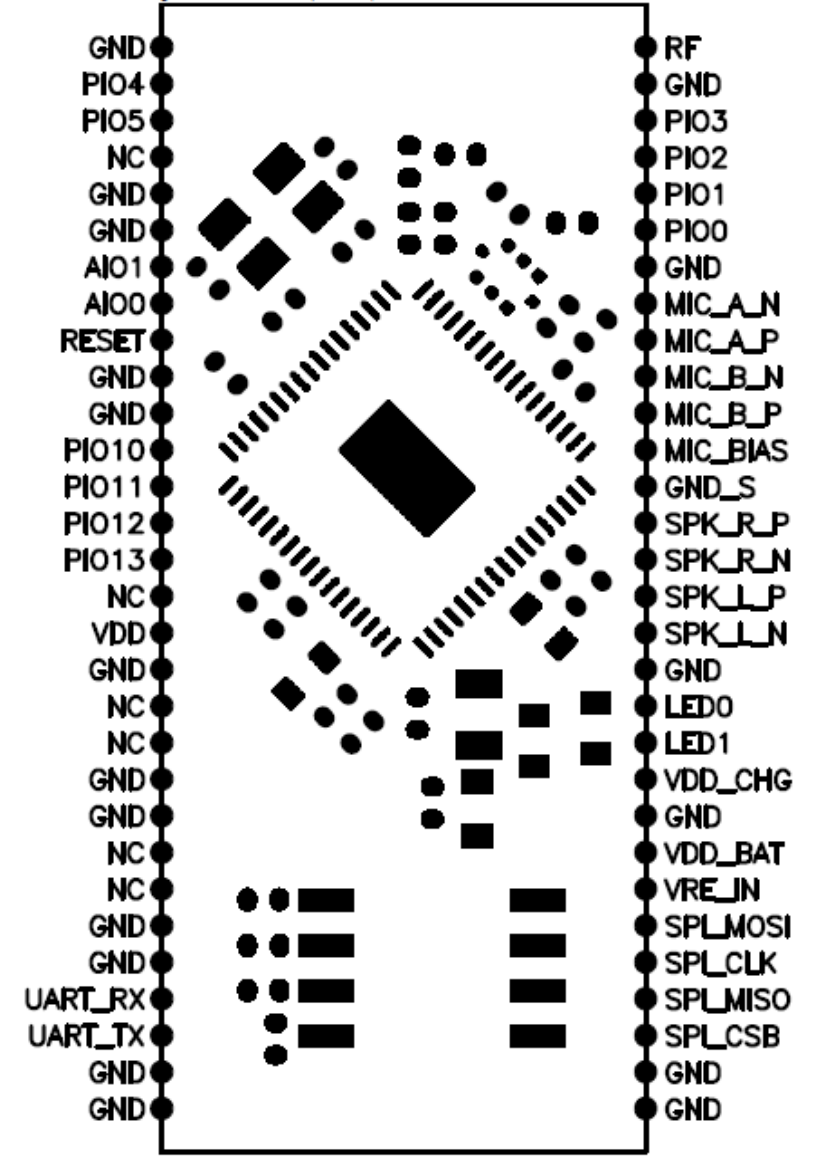
2. Package Information
2.1 Pinout Diagram
Figure 1: BC05 ROM Module Pinout (Top View)

2.2 Terminal Functions
Pin Name Pin Number Description
GND 1 Ground
PIO4 2
PIO5 3
Programmable input/output line
NC 4 NC
GND 5 Ground
GND 6 Ground
AIO1 7
AIO0 8
Analogue programmable input/output line
RESET 9 System Reset(Low Active)
GND 10 Ground
GND 11 Ground
PIO10 12
PIO11 13
PIO12 14
PIO13 15
Programmable input/output line
NC 16 NC
VDD 17
Positive supply for SPI/UART ports and PIO[13:10]
&PIO[5:0] and EEPROM, Connect to 3.3V
GND 18 Ground
NC 19 NC
NC 20 NC
GND 21 Ground
GND 22 Ground
NC 23 NC
NC 24 NC
GND 25 Ground
GND 26 Ground
UART_RX 27 UART data input, active high
UART_TX 28 UART data output, active high
GND 29 Ground
GND 30 Ground
GND 31 Ground
GND 32 Ground
SPI_CSB 33 Chip select for SPI, active low

SPI_MISO 34 SPI data output
SPI_CLK 35 SPI clock
SPI_MOSI 36 SPI data input
VRE_IN 37
Take high to enable high-voltage linear regulator
and switch-mode regulator
VDD_BAT 38
Lithium ion/polymer battery positive terminal.
Battery charger output and input to switch-mode
regulator
GND 39 Ground
VDD_CHG 40 Battery charge input
LED1 41
LED0 42
LED Driver
GND 43 Ground
SPK_L_N 44 Speaker output negative, left
SPK_L_P 45 Speaker output positive, left
SPK_R_N 46 Speaker output negative, right
SPK_R_P 47 Speaker output positive, right
GND_S 48 Signal Ground
MIC_BIAS 49 Microphone bias
MIC_B_P 50 Microphone input positive, right
MIC_B_N 51 Microphone input negative, right
MIC_A_P 52 Microphone input positive, left
MIC_A_N 53 Microphone input negative, left
GND 54 Ground
PIO0 55
PIO1 56
PIO2 57
PIO3 58
Programmable input/output line
GND 59 Ground
RF 60 Transmitter output/switched receiver input
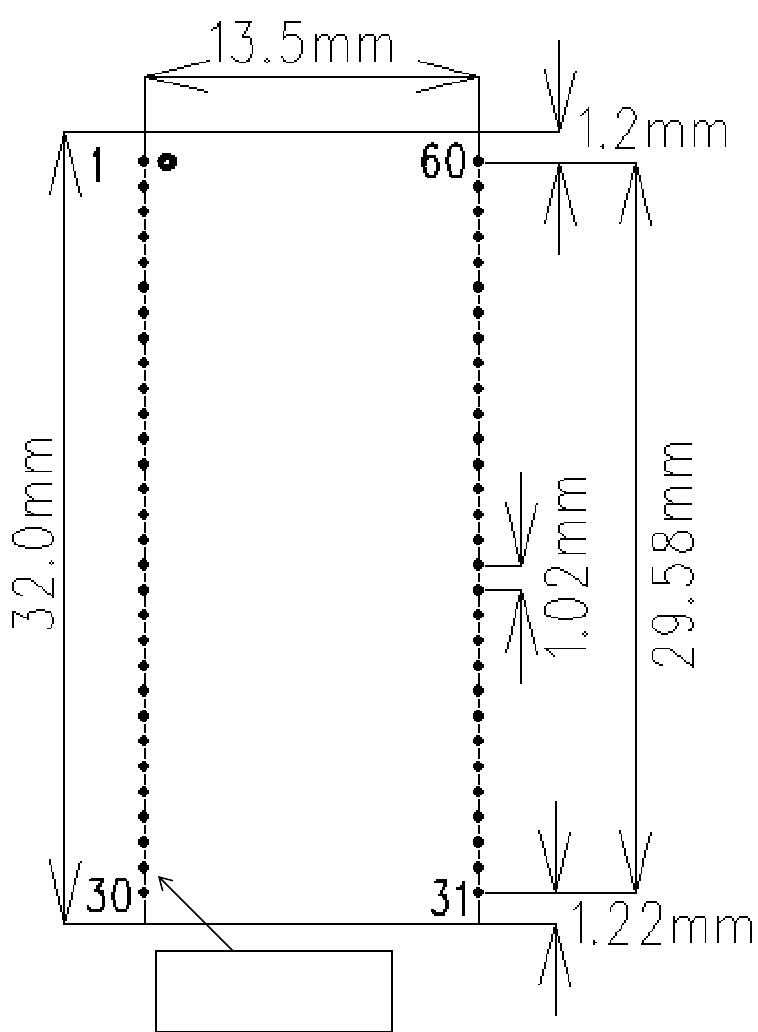
2.3 Package Dimensions
Figure 2: BC05 ROM Module package Dimensions
Ø0.45mm X 60
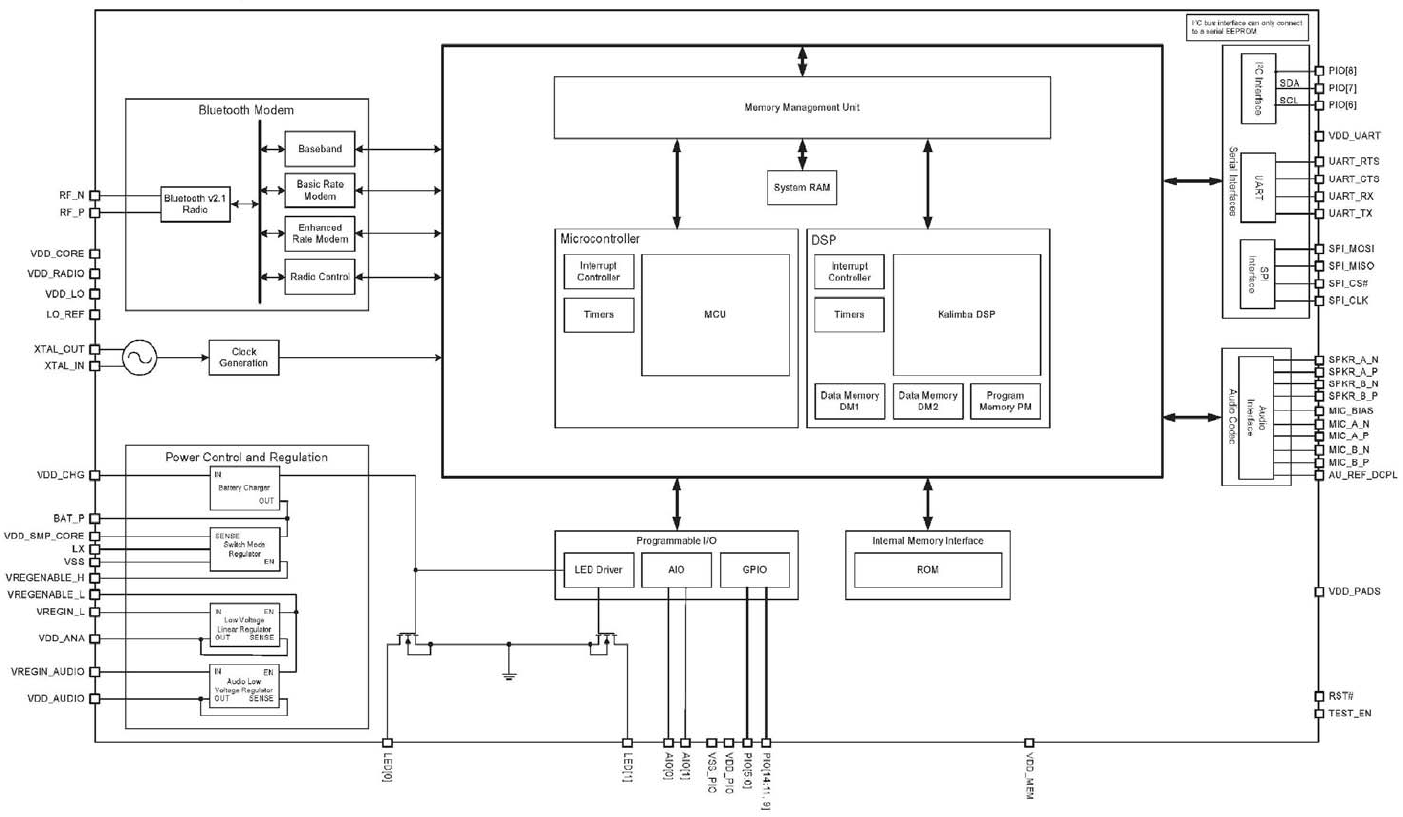
3. Hardware Description
3.1 Block Diagram
Figure 3: BC05 ROM Module Block Diagram
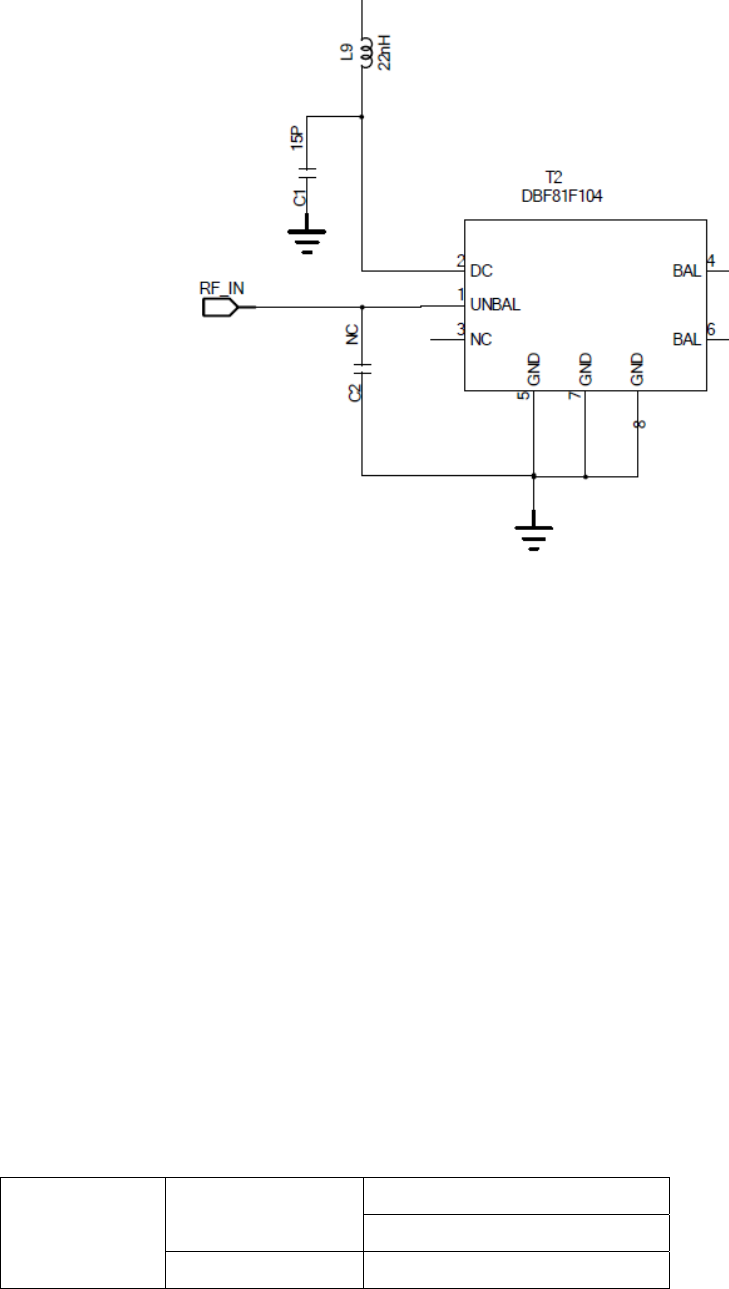
3.2 RF Ports
Figure 4: RF Ports Diagram
RF_N and RF_P form a complementary balanced pair and are available for both transmit and
receive. On transmit their outputs are combined using an external balun into the single-ended
output required for the antenna. Similarly, on receive their input signals are combined internally.
Both terminals present similar complex impedances that may require matching networks
between them and the balun.
An LC network: L9 and C1. This provides a DC bias for the BlueTunes ROM from the 1.5V rail.
The T2 used to suppress the signal out of Bluetooth Frequency Band and enhance the EMC
capacity.
The DC level must be set at VDD_RADIO.
3.3 UART Ports
BC05 ROM Module UART interface provides a simple mechanism for communicating with
other serial devices using the RS232 protocol. When BlueTunes ROM QFN is connected to
another digital device, UART_RX and UART_TX transfer data between the two devices.
The Baud rate of the UART ports:
1200 baud (≤2%Error)
Minimum 9600 baud (≤1%Error)
Baud rate
Maximum 4Mbaud (≤1%Error)
4. Green Products and RoHS Compliance
5. Reference
1) BlueTunes ROM Product Data Sheet, CS-122312-DSP1
2) Specification of the Bluetooth System, Version 2.1+EDR
FCC Statement
This equipment has been tested and found to comply with the limits for a Class B
digital device, pursuant to Part 15 of the FCC Rules. These limits are designed to
provide reasonable protection against harmful interference in a residential installation.
This equipment generates, uses and can radiate radio frequency energy and, if not
installed and used in accordance with the instructions, may cause harmful interference
to radio communications. However, there is no guarantee that interference will not
occur in a particular installation. If this equipment does cause harmful interference to
radio or television reception, which can be determined by turning the equipment off
and on, the user is encouraged to try to correct the interference by one of the
following measures:
- Reorient or relocate the receiving antenna.
- Increase the separation between the equipment and receiver.
- Connect the equipment into an outlet on a circuit different from that to which the
receiver is connected.
- Consult the dealer or an experienced radio/TV technician for help.
FCC Caution:
Any changes or modifications not expressly approved by the party responsible for
compliance could void the user's authority to operate this equipment.
This device complies with Part 15 of the FCC Rules. Operation is subject to the
following two conditions:
(1) This device may not cause harmful interference, and
(2) This device must accept any interference received, including interference that may
cause undesired operation.
FCC Radiation Exposure Statement:
This equipment complies with FCC radiation exposure limits set forth for an
uncontrolled environment. This transmitter module must not be co-located or
operating in conjunction with any other antenna or transmitter.
The module must be installed in Sound Kick Audio System.
This End equipment should be installed and operated with a minimum distance of 20
centimeters between the radiator and your body.
IMPORTANT NOTE:
In the event that these conditions can not be met (for example certain laptop
configurations or co-location with another transmitter), then the FCC authorization is
no longer considered valid and the FCC ID can not be used on the final product. In
these circumstances, the OEM integrator will be responsible for re-evaluating the end
product (including the transmitter) and obtaining a separate FCC authorization.
End Product Labeling
The final end product must be labeled in a visible area with the following:
“Contains FCC ID:UZZSFQ04A”.
Manual Information to the End User
The OEM integrator has to be aware not to provide information to the end user
regarding how to install or remove this RF module in the user’s manual of the end
product which integrates this module.
Canada Statement
This device complies with Industry Canada licence-exempt RSS standard(s).
Operation is subject to the following two conditions: (1) this device may not cause
interference, and (2) this device must accept any interference, including interference
that may cause undesired operation of the device.
Le présent appareil est conforme aux CNR d'Industrie Canada applicables aux
appareils radio exempts de licence. L'exploitation est autorisée aux deux conditions
suivantes : (1) l'appareil ne doit pas produire de brouillage, et (2) l'utilisateur de
l'appareil doit accepter tout brouillage radioélectrique subi, même si le brouillage est
susceptible d'en compromettre le fonctionnement.
Caution Exposure:
This device meets the exemption from the routine evaluation limits in section 2.5 of
RSS102 and users can obtain Canadian information on RF exposure and compliance.
Le dispositif répond à l'exemption des limites d'évaluation de routine dans la section
2.5 de RSS102 et les utilisateurs peuvent obtenir des renseignements canadiens sur
l'exposition aux RF et le respect.
The final end product must be labelled in a visible area with the following:
The Industry Canada certification label of a module shall be clearly visible at all times
when installed in the host device, otherwise the host device must be labelled to
display the Industry Canada certification number of the module, preceded by the
words “Contains transmitter module”, or the word “Contains”, or similar wording
expressing the same meaning, as follows:
Contains transmitter module IC: 7633A-SFQ04A
The module must be installed in Sound Kick Audio System.
This End equipment should be installed and operated with a minimum distance of 20
centimeters between the radiator and your body.
Cet équipement devrait être installé et actionné avec une distance minimum de 20
centimètres entre le radiateur et votre corps.
The end user manual shall include all required regulatory information/warning as
show in this manual.